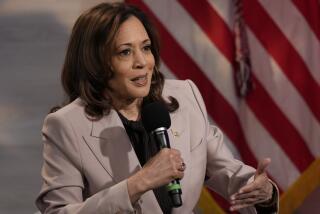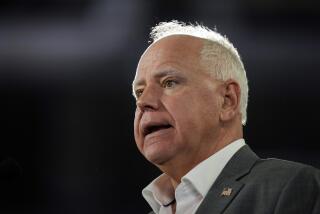Bush Says He’s Ready for Prime-Time Debates
- Share via
PORTLAND, Maine — Republican presidential nominee George W. Bush said Tuesday that he welcomes prime-time debates with Democratic rival Al Gore and rejected criticism that he is shying away from debating the vice president.
“The vice president has said that ‘I’ll debate him any time, anywhere, anyplace.’ And we will take him at his word,” Bush insisted while traveling from Austin, Texas, to an education round-table here. “We will pick and choose the venues that enable us both to discuss what we want to do should we become the president.”
Gore’s campaign chairman, Bill Daley, on Tuesday formally accepted the Commission on Presidential Debates’ proposal for three prime-time, 90-minute debates, which all major television networks would be allowed to broadcast.
In a letter to the commission, Daley also accepted the Bush campaign’s proposal for a second debate between the vice presidential candidates, Republican Dick Cheney and Democrat Joseph I. Lieberman. The commission has scheduled only one debate for the vice presidential nominees, for Oct. 5, but is willing to host a second.
The Bush campaign has received 53 invitations for presidential debates and is negotiating over which three to accept. Joe Allbaugh, campaign manager for the Texas governor, is scheduled to meet with the commission at the end of the week.
“We’re exploring options,” said Bush communications director Karen Hughes. “There’s a lot of new technology that’s come on board since the last presidential campaign.”
Among the options being considered, she said, are offers from cable networks and the possibility of an Internet simulcast--”new technology that allows people in their homes to participate.”
Gore spokesman Douglas Hattaway said the vice president would debate Bush elsewhere only if he commits to the commission’s schedule as well.
Hattaway noted that Bush’s father, President George Bush, and 1996 GOP presidential candidate Bob Dole both participated in the commission-sponsored debates. “If they’re good enough for them, why aren’t they good enough for him?”
“Maybe,” Hattaway continued, “Bush thinks he’s not ready for prime time. But he will bring his own strengths to the debate. His fabled charm will serve him well, I’m sure.”
As wrangling over debates continued, Bush focused Tuesday on education, charging that his opponent is the candidate of the “status quo” in a nation of failing schools.
If Americans want to close the so-called achievement gap between white students and their Latino and African American classmates, he said, “we’d better have a different education vision, a different president to lead our country in a direction of reform, the cornerstone of which should be strong accountability in the schools.”
During a three-day, five-state Eastern swing this week, Bush will visit school No. 100 of his campaign for president. On Tuesday, he noted that accountability measures are among the biggest differences between his education proposals and Gore’s.
One of the things that government, which funds public education, must do better is “instead of focusing on process, focus on results,” he said at a campaign event at Moore Middle School here. To do that, local districts must create and administer regular skill tests and stop promoting children who do not pass.
Gore’s plan is deficient, Bush has said this week, because it pushes for testing only in the fourth and eighth grades and before high school graduation. The results, he said, are “process-oriented” schools.
“Process-oriented systems ask the question, ‘How old are you?’ And if you’re 10, we’re going to put you here. And if you’re 14, we’re going to put you here,” Bush said. “A results-oriented question says, ‘What do you know?’ And if you don’t know what you’re supposed to know, we’ll make sure you do early, before it’s too late.”
Gore spokeswoman Kym Spell charged that Bush’s accountability plan is inferior to the Democrats’ because it penalizes public schools by allowing low-income parents, whose children are in failing institutions, to use federal money to put their offspring in private schools.
“All he’s put forward is abandoning low-performing schools with a voucher plan,” Spell said.
*
Times researcher Massie Ritsch contributed to this story.
More to Read
Get the L.A. Times Politics newsletter
Deeply reported insights into legislation, politics and policy from Sacramento, Washington and beyond. In your inbox twice per week.
You may occasionally receive promotional content from the Los Angeles Times.











